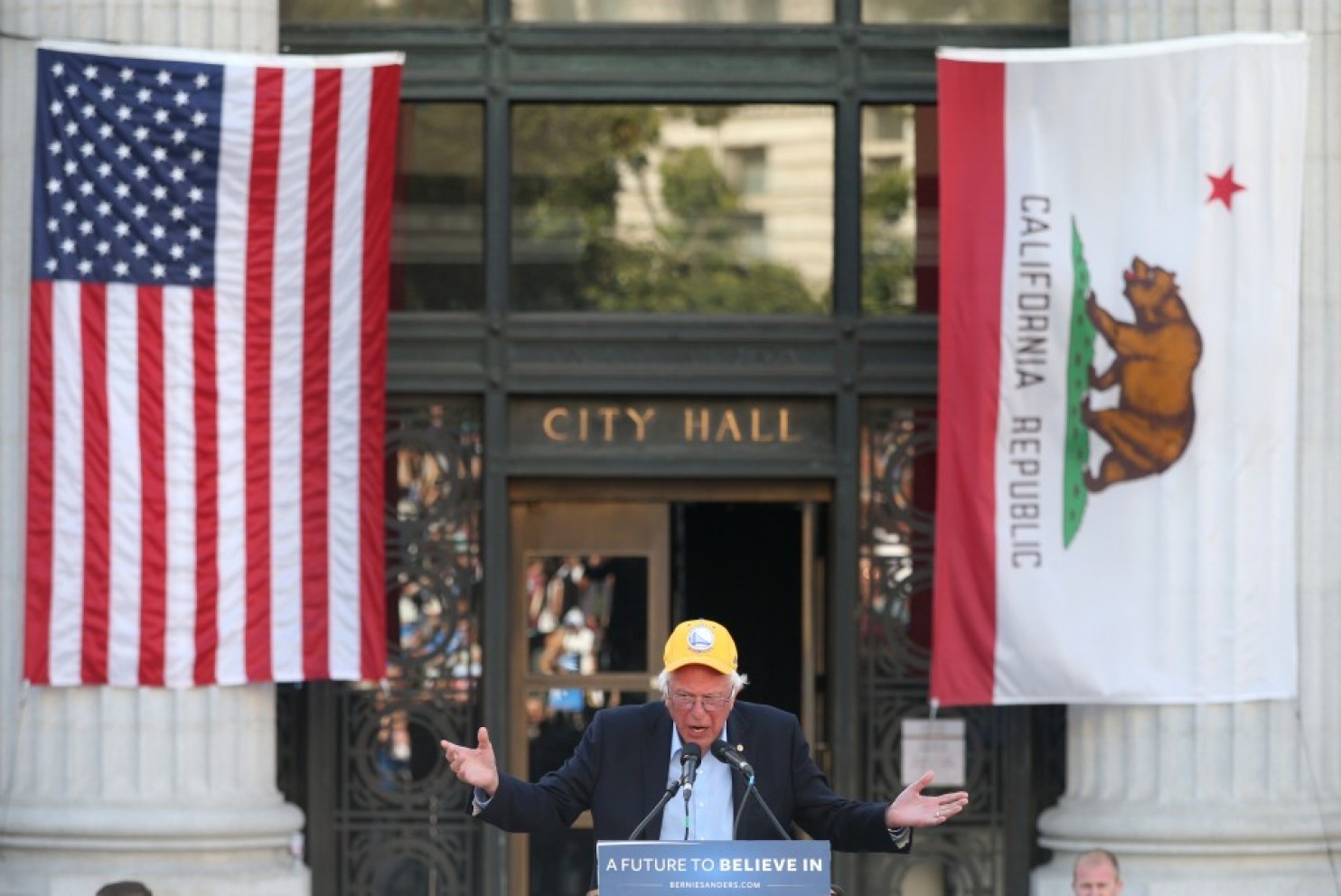Does the Democratic Party Platform Matter?; DNC Veoted Sanders Pick of Women Union Lader for Platform Committee

- Does the Democratic Party Platform Matter? - Robert Borosage (Campaign for America's Future)
- Sanders: DNC Vetoed Union Leader Pick for Platform Committee - David Weigel (Washington Post)
Presidential candidate Bernie Sanders has vowed to drive his bold policies ideas – from a $15 minimum wage and reviving union rights to tuition-free college and Medicare for All – into the Democratic Party platform to write the “strongest progressive agenda that any political party has ever seen.”
After initial skirmishing, the divisive chair of the Democratic National Committee, Debbie Wasserman Schultz, announced a compromise on the composition of the committee that will draft the Democratic Party platform. Sanders got five representatives, Clinton six. Wasserman Schultz named four, including progressive legislator Rep. Barbara Lee of California and the committee chair, Maryland Rep. Elijah Cummings, who was quoted earlier saying, “My advice to would be to try to first of all embrace the types of things that Bernie Sanders is talking about and speak to the needs of those folks who really want to be supportive of progressive policies.”
Progressives may well have a majority on the platform committee to write in much of the Sanders agenda. That raises the basic question: Does the platform matter?
Can’t Get No Respect
Generally, party platforms get no respect. A leader of the Clinton campaign previously in the Obama White House noted that he had never heard a word about the 2012 platform while in the White House. Clinton supporter Marcos Moulitsas, publisher of the Daily Kos, dismisses the platform, arguing that “if people want to fight over a document that no one will ever read or reference after the convention, all power to them.”
On the left, there is a widespread sense that a platform fight is a distraction at best. Carol Miller, writing in Counterpunch, scorns the platform as “irrelevant,” calling on Sanders to negotiate “essential agreements” with Clinton on what she will do instead of focusing on a document without power.
Candidates are not required to run on the platform. They are free to contradict some or all of its planks. They sculpt their own message and their own agenda. Platforms tend to be filled with gauzy language about shared goals – “all Americans should have access to affordable, high quality health care” – without making clear commitments on the policies needed to get there. Hillary Clinton could allow Sanders to write the platform without changing a word of her stump speech.
Movements Matter
Platforms are, however, a statement of the accepted beliefs of the party assembled. They are thus a measure of the evolving consensus of the party. For citizen movements, they are a measure of their progress in defining acceptable opinion in the party.
And ideas matter. A commitment to ending segregation or guaranteeing the right to vote. Equal rights for women. Embrace of marriage equality. No first use of nuclear weapons. An end to the Contra war in Nicaragua. A commitment to breaking up the big banks.
That’s why citizen movements frequently drive fierce debates over platforms and planks. In the early 1970s, feminists battled over women’s right to choose in the Democratic Party. Their success didn’t read anti-choice politicians out of the party immediately, but it signaled their defeat and slow erosion. In contrast, the 1980 Republican Party platform called for a constitutional amendment to restore protection of the “life of unborn children,” reflecting the growing isolation of pro-choice Republicans. In 2012, the Democratic Party platform affirmed its commitment to legalization of same-sex marriage. Democrats grew more confident of asserting their social liberalism rather than masking it. The platform didn’t cause these changes; political movements did. But the platforms did reflect the success of those movements.
For active citizen movements, the “irrelevant” planks of the party platform are particularly meaningful. The fight to change them sharpens the debate, identifies allies and opponents, offers a new arena to carry on the argument, an occasion for organizing and mobilization.
And with victory, movements can give the platform teeth. Mobilized citizens challenge candidates on issues. Victory in the platform fights gives them another instrument for holding candidates accountable. If the party assembled favors breaking up the big banks, or the Equal Rights Amendment or ending the war on the Contras, Democratic politicians can be challenged if they are on what is now defined as the wrong side.
At the same time, opposition party candidates will invoke the other party’s platform to attack their opponent: “She claims to be for lower taxes, but she’ll vote with Democrats, and Democrats are committed to raising taxes.” This vulnerability is one reason why the parties’ establishments often resist putting any detail in the platform, and why citizen movements demand that the commitments be written into the documents.
The Obama Platform
The 2012 Democratic Platform is a statement of a party led by an incumbent president, running for re-election without opposition. It echoes the more populist tone that President Obama adopted for the campaign against Mitt Romney. It is primarily a defense of measures taken in Obama’s first term and a commitment to go forward, with sharp contrasts drawn to the platform of Romney.
Parts of it are revealing. The platform brags about “$2 trillion in spending reductions as part of a plan to reduce our deficits,” at a time when the economy is mired in slow growth due in large part to the lack of public investment. It boasts that the president’s budgets will “bring annual domestic spending to its lowest level as a share of the economy in 50 years,” when the country desperately needs greater public investment in areas vital to its future. It hails the president’s defensive posture of an “all of the above energy policy.” It celebrates his trade accords, and pumps for the Trans-Pacific Partnership deal. It reaffirms that Jerusalem is and will remain the capital of Israel, even while acknowledging that its final status is recognized to be part of any negotiation. On the other hand, it is detailed and firm in stating the party’s commitment to liberal stances on social issues from same-sex marriage to equal rights for women.
The 2016 Platform
It seems increasingly unlikely that Sanders will win the Democratic nomination (although he remarkably continues to gain in the polls – now neck-and-neck in California – despite 24/7 media announcing the race is over). But there is no question that he has won the policy debate. And he has every reason to push to have that victory written into the party’s platform.
Sanders will push to have the platform lay out a bold populist critique of our corrupted politics and our rigged economy. He’ll craft a clear statement of how we change our course to clean up our politics. He will call for reversing the obscene and growing inequality with government action that will secure basic rights like affordable health care and college, and create jobs that move us to a full employment economy.
His delegates will insist that the platform reflect signature commitments: $15 minimum wage and the right to form unions, an end to big money in politics, Medicare for All, a real commitment to deal with climate change that begins with a tax on carbon and a ban on fracking, a bold plan to rebuild America and invest in people – including $1 trillion over ten years for 21st century infrastructure, tuition-free college, universal preschool and more – paid for by specific progressive tax reforms, raising taxes on the rich, closing corporate loopholes and levying a tax on Wall Street speculation.
He’ll demand commitments to break up Wall Street’s too-big-to-fail banks, and shackle its speculative excesses. He’ll demand a new trade policy, beginning with deep-sixing the Trans-Pacific Partnership deal. He’ll push for a commitment to enhance Social Security benefits by lifting the payroll tax cap.
On foreign policy, he will want to put the party on record as opposed to policing the world and in favor of smaller, less wasteful military budgets, skeptical of regime change and against the excesses of the imperial presidency. And he’ll call for signature policy proposals, including a recognition that Israeli security and Palestinian statehood are inextricably linked, for building zones of peace in Eastern Europe rather than continuing a dangerous arms buildup there and more.
Clinton would be wise to accept many of the Sanders amendments. Some – like a commitment to Medicare for All or for breaking up the big banks – if resisted, may well end up being debated before the entire convention.
Sanders won’t get everything he wants, but he’ll get a lot of it. And if he forces through both bold analysis and concrete reforms, the platform will provide a new measure of the emerging populist consensus of the party. And it will provide activists with a new instrument for defining who stands with the “political revolution” and who does not.

“What we heard from the DNC was that they did not want representatives of labor unions on the platform-drafting committee,” he said. “That’s correct.”
Yesterday, Wall Street Journal reporter Peter Nicholas was the first to report that Sanders had included RoseAnn DeMoro, executive director of National Nurses United, on his list of preferred platform committee members. "He told me that he really wanted me on the committee to advocate for Medicare for All, especially," DeMoro told The Washington Post today.
According to Sanders and DeMoro, the DNC nixed her, resulting in a Sanders delegation of four men, one woman (Native American activist Deborah Parker), and no one from organized labor. While many progressive commentators cheered Sanders's picks, which include the environmental writer and activist Bill McKibben and the academic iconoclast Cornel West, the gender and work balance opened him up to criticism.
"I think it was a set-up," said DeMoro. "It fed into the 'Bernie bro' narrative and meme -- oh, Bernie picked one woman, he's a sexist. As soon as the list was out, there were articles about how he chose two 'anti-Israel' people. The truth of the matter is that they were choices the DNC had signed off on."
In an interview Wednesday, DNC platform committee spokeswoman Dana Vickers Shelley confirmed that the DNC had not wanted labor leaders on the platform drafting committee, limiting labor's presence to Paul Booth of the American Federation of State, County, and Municipal Employees union.
“Because union leadership was represented on the full platform committee, a decision was made no union leadership would be represented on the platform drafting committee,” said Vickers Shelley. “That was communicated to the campaigns, and they understood our rationale.”
That was cold comfort to DeMoro. "The most insidious thing, frankly, is that only one of 15 people on this drafting committee is for labor," she said. "It shows you how insidious the DNC has become. Labor built this party. Labor built this country. One person is enough to represent all of that? If you look at the composition of who they chose, besides Bernie’s choices, K Street’s far better represented than the labor movement."
Juliet Eilperin contributed reporting from Washington.
